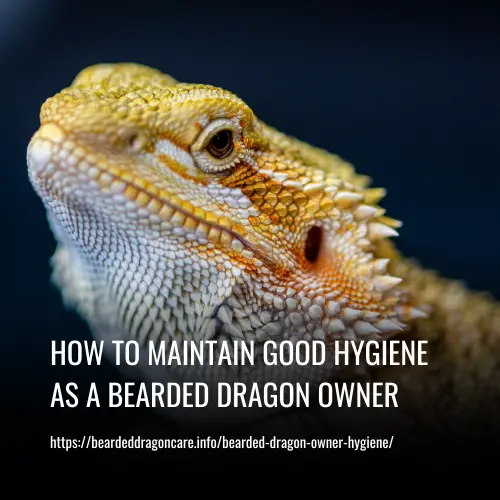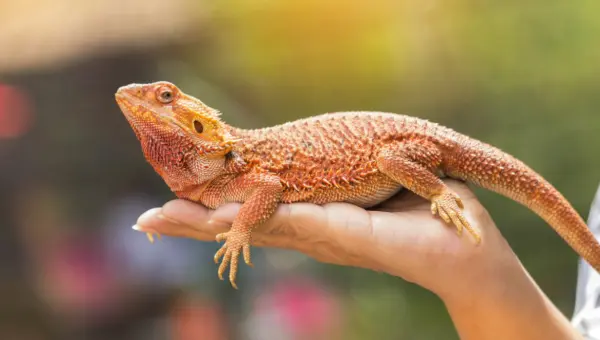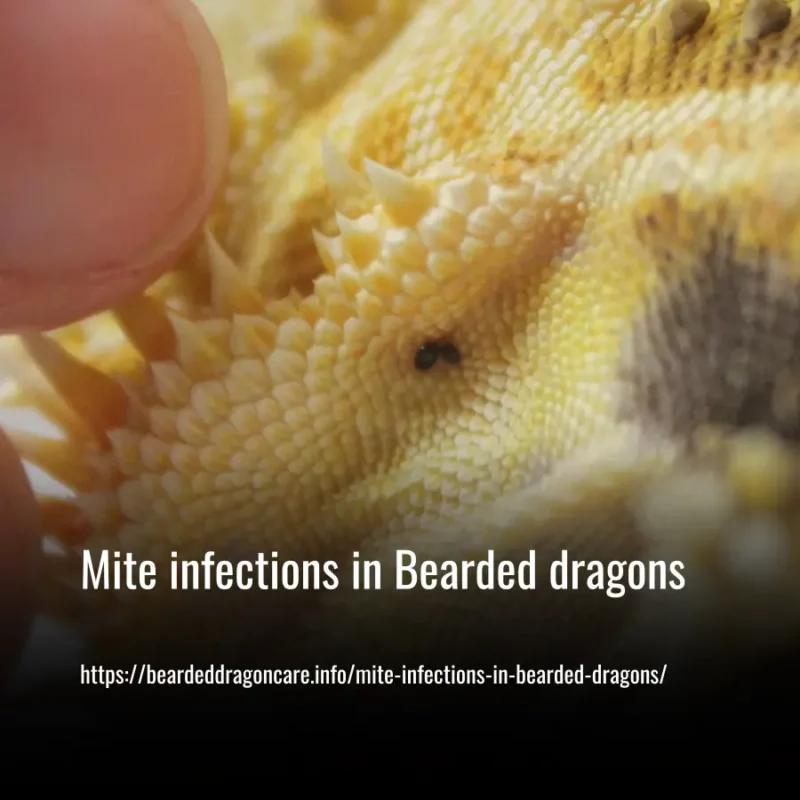While it is important to keep your pet Bearded dragon’s environment clean and hygienic, it is equally important to practice good hygienic principles on yourself too.
In its simplest form, hygiene refers to keeping things clean. Apart from this, personal hygiene is also important to help protect ourselves from micro-organisms that can cause various diseases. This article will point out some of the important hygienic principles that Bearded dragon owners should adopt. Also see best Bearded dragon hygiene practices for more information.

Why hygiene is important for Bearded dragon owners
There are a couple of good reasons why it is important to practice good hygiene when it comes to keeping a pet Bearded dragon. They are preventing you from getting diseases from your Bearded dragon and preventing the spread of Bearded dragon diseases.
Preventing humans from getting diseases from Bearded dragons
Some diseases, e.g. salmonellosis and campylobacteriosis, can be transmitted from reptiles to humans. These diseases are called zoonoses. Zoonotic salmonellosis is mostly reported to be from pet turtles, but Bearded dragon owners are also at risk. Campylobacter, which is also a bacteria found in the feces of reptiles, has been reported to be a significant cause of gastrointestinal disease in humans. In a study done by Harriet Whiley, Ryan McLean, and Kirstin Ross 60% of the captive/pet reptiles (of which some were Bearded dragons) tested were positive for the organism. There are also studies that say that mycobacteriosis, chlamydophilosis, Aeromonas, and Pseudomonas infections may also be of reptile origin.
It is also possible for humans to contract diseases from feeder insects.
Preventing the spread of Bearded dragon diseases
Some contagious diseases can spread from one Bearded dragon to another. This can either happen directly, e.g. when Bearded dragons sit on top of each other, or indirectly. Indirect transmission of diseases can take place through human hands and feeder insects. Common Bearded dragon diseases that can potentially spread indirectly are coccidiosis (through crickets), ‘mouth rot’, yellow fungus disease, and salmonellosis. It is suspected that Adenovirus infections in Bearded dragons can also spread indirectly.
Apart from practicing proper hygiene, the spreading of diseases can also be reduced by discarding uneaten feeder insects (especially crickets) or prevented by quarantine.
Good hygiene practices for Bearded dragon owners
In a summary, these are good hygiene principles for Bearded dragon owners:
- Do not touch your face while, or directly after, handling a Bearded dragon, the inside of its enclosure, feeder insects, or its substrate.
- Protect any open sores or wounds you might have on your hands before touching or handling a Bearded dragon.
- Wash and disinfect your hands (or in-contact skin) directly after handling a Bearded dragon, the inside of its enclosure, its food, or its substrate.
- Do not kiss a Bearded dragon or bring it close to your face.
- Do not eat while handling or even close in close proximity to Bearded dragons.
- Use safe, but proven disinfectants to wash, wipe or spray your hands.
Many diseases are transmitted through the mucous membranes of your mouth, eyes, and nose. Bringing a Bearded dragon close to your face can also allow micro-organisms to be inhaled while breathing. Some environmental bacteria will also be more than happy to grow on cuts and open wounds, causing serious wound infections. In these cases, it is better to use medical-grade disposable gloves while working with Bearded dragons.
Washing and disinfecting your hands
Washing and disinfecting your hands, including any other in-contact skin areas, after working with Bearded dragons are extremely important for Bearded dragons owners. By not doing so, microorganisms can remain on your skin for long periods and can still infect humans and other Bearded dragons.
Cleaning refers to either removal, wiping, or washing with water/soap after which it is dried. Disinfection refers to the cleaning of live tissues e.g. your hands, and hard surfaces with something that kills micro-organisms. Many disinfectants are in the form of hand soaps, sprays, wipes, and gels. These are popularly used and double up as a cleaning soap too.
F10 has a wide range of products including wipes, hand soaps, sprays, and contact cleaners, and safe and effective to use with most pets, incl. Bearded dragons.
There are various disinfectants on the market today. As mentioned earlier, they can be in the form of soaps, sprays, wipes, and gels. Some disinfectant products are sold as ready-to-use (RTU) while others are in a concentrated form that needs controlled dilution before it can be used.
Health & Hygiene’s F10 product range is tested safe and efficient to be used with Bearded dragons, reptiles, and other animals. Various forms of contact sprays, hand soaps, and gels are available from most veterinarians and some good pet shops.
Parents that keep Bearded dragons, or any other pet, should be responsible by teaching their children to wash and disinfect their hands frequently.
Humans that are at risk
It must be said that the chances are relatively small for contracting a disease from Bearded dragons, especially when there are only one or two and when proper hygiene is practiced. Although anyone might still be at risk, some people are more at risk than others. These include children, elderly people, and people that suffer from conditions that suppress their immune systems or where the immune system has not developed (e.g. HIV, cancer, chemotherapy, etc.).
Risks of Owning a Bearded Dragon
Owning a bearded dragon as a pet is not without risks. It is important to remember that they may carry bacteria that can cause Salmonella, which can be hazardous to both people and the reptile.
To minimize your chances of coming into contact with this bacteria, it is essential that you remember to always wash your hands thoroughly after handling your bearded dragon. Additionally, it is not recommended to kiss them due to the possibility of carrying Salmonella in their intestinal tract.
Moreover, it is important to be aware that one could become infected with parasites if bitten by the lizard. Therefore, it’s critical for all owners of these reptiles to take care of handling them so as not to harm themselves or their pets.
Good hygiene is key when it comes to owning a bearded dragon so make sure you follow all safety measures to keep both you and your lizard healthy and safe.
Can You Get Sick From Kissing a Bearded Dragon
Kissing a Bearded Dragon is not something people should be doing, as there is a risk of getting sick from it. Dr. Callista Chinenye Emecheta, a medical doctor with interest in public health and conducting postgraduate research at the University of South Wales in the United Kingdom, warns that salmonella germs can become airborne when you kiss, cuddle, or eat or drink around your bearded dragon and contaminate your mouth as a result.
This is why it is important to keep your pet away from places where food is stored, prepared, or eaten and to ensure that infants and children under five years do not come into contact with reptiles such as bearded dragons because they contain venom which can cause infections.
The CDC also recommends washing hands after handling them as Salmonella bacteria are common flora in lizards and have no symptoms so it can spread through exposure to fecal-oral routes or even environmental reservoirs like domestic and wild reptiles like snakes.
One particular zoonotic disease reported in 2017 was Campylobacter which accounted for nearly 70% of all cases caused by Lymphocytic Choriomeningitis mammarenavirus (LCMV).
Bearded Dragon Diseases Transmitted to Humans
Bearded dragons can carry diseases that can be transmitted to humans, such as Salmonella. This bacteria is known to cause serious problems and infections in humans, including diarrhea, abdominal cramps, fever, and vomiting. It is crucial to practice good hygiene when handling your pet bearded dragon and regularly clean their habitats in order to minimize the risk of infection.
This means you should always wash your hands thoroughly after handling them. If you have any open wounds or cuts on your skin, it’s best not to handle them and look after them from a safe distance. While passing on these diseases is not a common occurrence in bearded dragons, it’s important to be aware of all potential risks so both yourself and your pet stay safe.

Staying Safe Around Bearded Dragons
As a bearded dragon owner, it is important to practice good hygiene when caring for your pet. Salmonella can be spread from their droppings to your body, as well as between people, so you must always wash your hands after handling them or feeding them. Additionally, make sure to keep the area where they live and roam clean to avoid any health risks.
It is normal for these reptiles to eat shed skin that is full of calcium and their skin can easily scratch if not treated properly. To avoid getting injured, it is recommended that you wear protective clothing when dealing with your dragon. Also, make sure that their wounds are thoroughly washed in order to reduce the chances of infection.
Remember, even though Salmonella is unlikely with a bearded dragon, take extra precautions especially if you have young children, elderly people, or someone with weakened immunity around them.
FAQs
Do I have to wash my hands after holding a bearded dragon?
It is possible for you to contract Salmonella from your bearded dragon or its environment. Therefore, it is essential to always wash your hands with soap and water after coming into contact with your pet, or the area where it lives and roams. Additionally, make sure to always wash up after you feed your dragon.
Can I handle a bearded dragon every day?
Daily handling of your bearded dragon makes them more accustomed to people and less stressed during regular care, like bathing and tank cleaning. Bearded dragons are usually gentle and easy to hold.
Are bearded dragons clean pets?
Bearded dragons are easy to clean because they keep themselves tidy and do not produce odors. Regular spot cleaning of the environment is important for sanitation.
Conclusion
In conclusion, owning a bearded dragon can be loads of fun, but it also comes with responsibility. Good hygiene is key when it comes to owning a bearded dragon so make sure you follow all safety measures to keep both you and your lizard healthy and safe.


